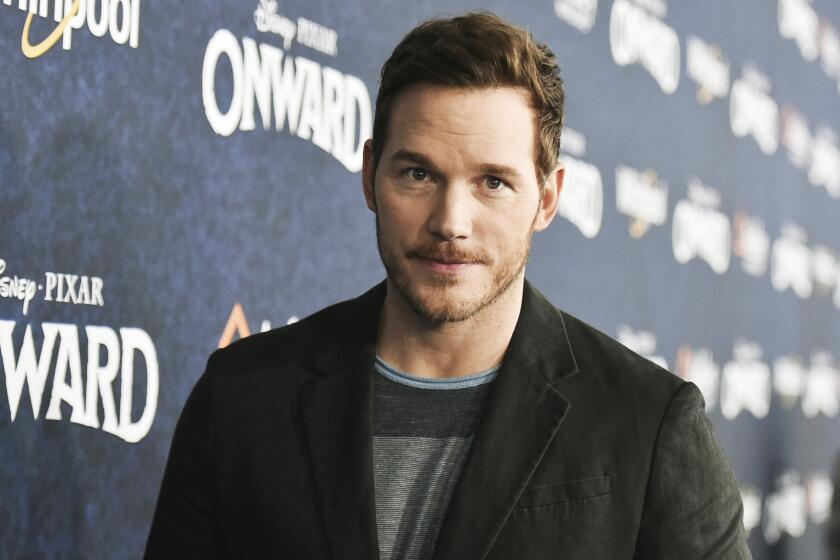Before ‘GLOW’ got canceled, its actresses of color felt ‘disempowered’ by their roles
- Share via
“GLOW” had a reputation.
The hit Netflix series was known for its ensemble cast, fighting the patriarchy (literally) and being “diverse without being about diversity.”
Yet behind the scenes, cast members of color had called on showrunners and producers to implement specific guidelines to better represent their characters, whom they felt were “less dimensional” and perpetuating racist stereotypes.
“GLOW,” a fictionalized account of the 1980s show “The Gorgeous Ladies of Wrestling,” was officially canceled by Netflix two weeks ago, even though filming of the fourth and final season was already underway.
On Monday, Sunita Mani, who plays Arthie “Beirut the Mad Bomber” Premkumar, posted on Instagram a letter that she and five other actresses of color on the show had written to “GLOW” creators and executive producers earlier this year.
“As the principal women of color on a show tackling racist and offensive stereotypes, we have felt disempowered throughout our time on GLOW,” the letter reads. “It has been problematic to use our faces, oftentimes solely in the context of a racist storyline, and to be brief with our story development to serve the in-depth white storylines.”
Robert Downey Jr., Zoe Saldana and Mark Ruffalo are rallying behind Marvel colleague Chris Pratt after Twitter dubbed him the worst Hollywood Chris.
The letter was co-signed by Mani, Sydelle Noel (Cherry “Black Magic” Bang), Britney Young (Carmen “Machu Picchu” Wade), Shakira Barrera (Yolanda “Junkchain” Rivas), Kia Stevens (Tammé “The Welfare Queen” Dawson) and Ellen Wong (Jenny “Fortune Cookie’ Chey) — all women of color who play recurring characters.
When contacted for further comment, reps for Noel and Mani referred The Times to the actresses’ Instagram statements.
“GLOW has been marketed as a diverse ensemble, but for all of us diverse cast members, it has never lived up to these ideals,” their letter continues. “Unfortunately, we feel that the promise of this show has not been fulfilled.”
Although media reports initially picked up on Mani’s post, the six actresses made a concerted effort to publicize the letter, each sharing it (and thoughts on their own experiences on the show) and tagging one another Monday.
“With zero persons of color in the writer’s room this season, it is a huge oversight to be writing our narratives without anyone else to represent us besides ourselves,” the letter says. “The meta narrative of our show — actors dealing with the conflict of perpetuating stereotypes in order to have opportunity — is exactly what is happening in our real life.”
Their statement highlights an important point: Mani, Noel, Young, Barrera, Stevens and Wong each play a racialized character intended as pointed commentary on harmful stereotypes.
“Even when our show seeks to comment on this standard, it perpetuates it,” the letter says. “We can no longer be quiet about the pain this has caused us and the harm it has done in perpetuating the representation of people of color as sidekicks to elevate white leads.”
Those white leads include Alison Brie (Ruth “Zoya the Destroya” Wilder) and Betty Gilpin (Debbie “Liberty Belle” Eagan), who both talked with The Times last year about how the show’s wrestling concept empowers their characters.
But the letter to the show’s creative team made it crystal clear: Their purpose was not to put down their white castmates, but rather to uplift everyone together.
“We feel it is our duty as artists to tell stories that represent the world we live in,” they wrote. “This is why it is important to hold our show accountable, and when presented with an opportunity, be truthful with the public about this process and our feelings.”
The original letter contained three key requests: hire an executive or consulting producer of color; address how portraying stereotypical and racially offensive wrestling personas has affected the characters’ professional lives and personal dignity; and amplify the actresses’ voices and importance within the fourth-season narrative.
It ended with an optimistic call to arms: “We hope we can be leaders together in fighting for true equality!”
Of course, “GLOW” didn’t quite make it to Season 4. Production on the show’s last season resumed in February, but the cast and crew were able to complete only one episode before stay-at-home orders went into effect in L.A. County. (“GLOW” was filmed entirely in L.A.)
“We’ve made the difficult decision not to do a fourth season of GLOW due to COVID, which makes shooting this physically intimate show with its large ensemble cast especially challenging,” a Netflix spokesperson told The Times in an Oct. 5 statement.
“GLOW” co-creators Liz Flahive and Carly Mensch lamented Netflix’s decision to end the show.
“COVID has killed actual humans. It’s a national tragedy and should be our focus,” Flahive and Mensch said earlier this month. “COVID also apparently took down our show. Netflix has decided not to finish filming the final season of GLOW.”
Before the cancellation, however, Flahive, Mensch and Netflix executives met with the cast to hear their concerns, planning to listen and bounce back ideas for discussion.
While the writers room was not running at the time, plans were in place to address these concerns in the upcoming season, The Times has learned. Those proposed changes to the final season did not affect the decision to cancel the show, which came to an end due to safety and financial concerns related to the pandemic.
“Ultimately, CHANGE BEGAN TO UNFOLD,” Barrera wrote on Instagram. “Our producers began to work on the list of actions during our hiatus, beginning with the systemic issues we had mentioned and ending with a complete sob-filled Zoom disclosing how much the season would really reflect what a true diverse ensemble cast looks like. I got chills hearing the changes implemented and how the season would unfold for these women.”
Although some, including fellow “GLOW” star Marc Maron (Sam Sylvia), have floated the idea to “finish the story” in a Netflix movie, that does not address the safety concerns of shooting a large ensemble cast safely during the pandemic.
“From tokenism in 1985, to elevating representation in 2020, to representing a data point in the ether and beyond, how are we connecting to human people? And who’s listening?” Mani wrote on Instagram. “Whatever/whoever you are, I’d like our voice and behind-the-scenes narrative of representation to be the last word. Not Covid.”
More to Read
The complete guide to home viewing
Get Screen Gab for everything about the TV shows and streaming movies everyone’s talking about.
You may occasionally receive promotional content from the Los Angeles Times.








